
DA minerals shadow minister James Lorimer
The glacial pace at which the Department of Mineral Resources and Energy (DMRE) has been moving on the implementation of a national minerals rights cadastral system is a reflection of the fact that there is so much corruption to hide, opposition party Democratic Alliance minerals shadow minister James Lorimer said on June 2.
Speaking at the Junior Indaba, in Johannesburg, he said the situation had progressed beyond the DMRE just not having a sense of urgency, to where it “was now apparent that there were ulterior motives” behind the delays.
A cadastral system would reduce human inputs by incorporating automated processes, thereby significantly enhancing the reliability and transparency of the mineral regulatory system in South Africa.
This would help root out corruption, which Lorimer believes is the main reason for the unreasonable delays.
By creating a system that applies to the entire mining life cycle, mining cadastres provide a tool by which governments may regulate the industry effectively, as well as monitor and regulate it through checks, balances and automated record keeping.
Several other African countries, among the most recent being Botswana and Mozambique, have already implemented cadastral systems for managing mineral rights.
A cadastral system would log all properties in the country, specifying who is permitted where, for which commodity, where a right’s borders are and the expiry date of those rights.
A minerals cadastre would list available mining or prospecting rights, properties currently under a mining or prospecting right and the expiry of currently held rights and ownership thereof.
However, what pundits have said would make minerals cadastres particularly useful for the mining industry – particularly the junior mining and prospecting sector – is that they would also contain all historical prospecting data generated by previous exploration parties.
Minerals Council South Africa CEO Roger Baxter on June 1 told delegates attending the Junior Indaba that the DMRE’s struggles to implement a new cadastral system, among other constraints, was limiting the country to less than 1% of global exploration spend.
Mineral Resources and Energy Minister Gwede Mantashe in April told delegates at the 2022 PGMs Industry Day that the cadastral system – for which the mining and exploration industry has been begging for over the past decade – was one of the DMRE’s “biggest nightmares”.
He blamed the ongoing lack of implementation of a mineral rights cadastre on the sluggishness of the legal system.
“I gave the responsibility [of the cadastral system] to a lawyer, who has moved very slowly on it,” he said in April.
Lorimer expressed frustration at Mantashe’s ongoing excuses and “passing the buck”.
“I know there are government processes. I do understand this. However, any Minister who had an inkling of the importance of this would be sitting on the heads of every other government department and making a noise to get Cabinet to push it through. This hasn't happened. It's just being side-lined, so it's not really seen as important,” he said.
Lorimer viewed a national online cadastral system as being a critical part of paving the way for rapid growth in the mining sector, one of three sectors – alongside agriculture and tourism – that he believed had the potential to pull South Africa out of the economic hardship it faces.
In addition to getting the cadastral system up and running, which he believed was the “quickest win” that the government could roll out, he said there was an urgent need to deregulate the mining sector as much as possible. This would encourage more investment and ramp the sector up as quickly as possible.
In addition, there remained a dire need to remove corruption among public officials. Lorimer believed corruption had not been rooted out to the extent the ruling party, the African National Congress, would have the public believe.
“We have found that it is surprisingly easy to get civil servants to behave. We encountered this in the Western Cape province and in a number of municipalities where we took over. You just have to show that there are consequences for bad behaviour and, very quickly, people start falling in line,” he said.